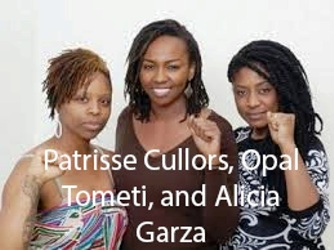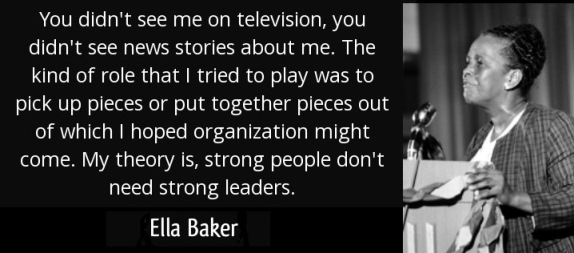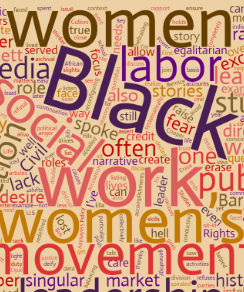I study erasures of Black women’s labor in social movements. I do this work because of the numerous ways organizations I’ve helped create have minimized or erased my work in their master narratives.
I simultaneously conducted my dissertation research while actively agitating against my own erasure and the erasure of the team I worked with to create a farmers market in my hometown. As this market opened in 2014, I was appalled at how quickly the public narrative moved away from the student-led genesis of the work and shifted toward the after-the-fact funders and selected market directors. How could the origins be so completely erased when all the key players were still alive and consciously aware of the division of labor?
I conducted my dissertation research while facing an incident in which I was accused of not giving someone credit for her work, only to realize this accusation was only possible because my work on the project had been so thoroughly minimized that even people close to the project had no idea of the depth of my contribution.
Several decades of scholarship show that Black women’s labors are consistently erased in the stories of social movements. During the six years I spent in graduate school, I lost count of the number of journal articles and books that sought to excavate Black women’s historical and contemporary labor. The advent of social media, however, allows for a public and more accessible real-time listing of not only our accomplishments but our slights as well, as movement action after movement action shows the organizing might of Black women with an almost immediate privileging of Black men as the leaders of the movements (Cooper, 2017, p. 26).
 Once this sleight of hand happens, the story shifts to “great men” and away from the quotidian work of community and national organizing and activism, and the brave leadership and vulnerability it takes to sustain a movement. Black Lives Matter (BLM) is a perfect example of this phenomenon. BLM co-founder Alicia Garza carefully detailed the origins of Black Lives Matter in October of 2014. It is 2020 and naysayers continue their refusal to read or listen to the intellectual work of Garza, Patrisse Cullors, and Opal Tometi. Three queer Black women founded the BLM National Network and chose to assert that each Black life matters. Instead, I witnessed this interesting obsession with actively recreating the organization’s genesis, genealogy, and goals while the three women existed and were available to answer questions.
Once this sleight of hand happens, the story shifts to “great men” and away from the quotidian work of community and national organizing and activism, and the brave leadership and vulnerability it takes to sustain a movement. Black Lives Matter (BLM) is a perfect example of this phenomenon. BLM co-founder Alicia Garza carefully detailed the origins of Black Lives Matter in October of 2014. It is 2020 and naysayers continue their refusal to read or listen to the intellectual work of Garza, Patrisse Cullors, and Opal Tometi. Three queer Black women founded the BLM National Network and chose to assert that each Black life matters. Instead, I witnessed this interesting obsession with actively recreating the organization’s genesis, genealogy, and goals while the three women existed and were available to answer questions.
Black women who served as leaders of individual chapters faced the same treatment. I spoke directly with one of the founders and she, like hundreds of Black women before her, spoke of the movement being more important than the particulars of credit. Several of the narrators in my dissertation research echoed this facet of their organizing philosophy. The problem with this viewpoint is that it does matter how we detail the work of social movements, if for no other reason than historical accuracy. Who did the day-to-day movement work such as political education, canvasing, voter registration drives, surveys, rapport building within the community, coalition-building outside the community, action planning, mobilization, mass mobilization, and record-keeping matters, because no movement’s existence begins and ends at the public-facing spokespeople—most often men. This lack of desire or fear of telling the truth of social-movement work miseducates the next generation of organizers and activists.
After successfully defending my dissertation that centered the experiences of Black female students while detailing Fayetteville State University students’ participation in the Civil Rights/Black Power Movement(s), I no longer think about the issue as simply the erasure of Black women’s labor. I’m equally interested in how the work is erased and how we can all work to prevent future erasure.
How We Erase Black Women’s Work
We erase Black women in at least, but not exclusively, three ways. I use the pronoun “we” when discussing Black women’s erasure because we all contribute to the overt and covert actions that I discuss below.
First, our penchant for focusing on only the perceived final product of movement work—a specific march or a specific sit-in for example—not only ignores the care and work that went into organizing and mobilizing for a protest action but also ignores the Black women who did the work. Historically, Black women saw “the work” as more important than any kind of glory or attention one might get for providing the intellectual or physical labor. I found this to be true in my own research. If I only asked about protest actions without directly asking about women’s involvement or leadership, it would have been easy for me to write a story devoid of the names of Black women, even when Black women made up the overwhelming majority of the activists during the protests under investigation. In contemporary social justice or human rights organizations, it would do us well to think about how we came to learn about or join the organizations, or how we came to devote money, time, and energy to organizations or causes. Much of that foundational work is the work of Black women.
I deplore grabbing microphones. Outside of severe stage fright, I do not trust the media to accurately or empathetically publish Black women’s stories. My distrust is supported by historical evidence. Additionally, I’ve lived a life in which Black women who spoke up or over Black men were ostracized and sometimes quietly iced out of community functions. The number of times I’ve had to sit still and allow Black men with limited knowledge of my organizations talk over the Black women who founded and grounded the organizations is incalculable. Black men face no such fear when steamrolling over Black women.
 The second way we erase Black women’s work is by allowing the media to determine the outer face of an organization, thereby reconfiguring its inner workings. When Black women avoid the microphone and media spotlight and focus on the work at hand, it allows for a perceived leadership vacuum, which the media fills with whomever it chooses. We also allow Black men to celebrate our perceived lack of desire to enter the public sphere. I cringe when Black men deify Ella Baker, not for her quite literal foundational work in mentoring and aiding in the creation of the Student Non-Violent Coordinating Committee (SNCC) and strengthening the National Association for the Advancement of Colored People (NAACP) and the Southern Christian Leadership Conference (SCLC), but for her lack of affection for the media’s microphone.
The second way we erase Black women’s work is by allowing the media to determine the outer face of an organization, thereby reconfiguring its inner workings. When Black women avoid the microphone and media spotlight and focus on the work at hand, it allows for a perceived leadership vacuum, which the media fills with whomever it chooses. We also allow Black men to celebrate our perceived lack of desire to enter the public sphere. I cringe when Black men deify Ella Baker, not for her quite literal foundational work in mentoring and aiding in the creation of the Student Non-Violent Coordinating Committee (SNCC) and strengthening the National Association for the Advancement of Colored People (NAACP) and the Southern Christian Leadership Conference (SCLC), but for her lack of affection for the media’s microphone.
Even when an organization is egalitarian by overt choice or by ideology, the media—and therefore the public—refuse to stop trying to declare a singular leader. This goes further than the desire for a spokesperson. This relentless push for a singular head and therefore a singular founder or thinker sometimes serves to rewrite the organization’s creation and genealogical stories. At the speed of light, the public discourse about the organization ceases to include the women whom all interested parties know did the material work and movement.
In the case of BLM, an organization that was egalitarian, queer-affirming, anti-ageist, and cognizant of the double duty women often perform in movement work (at their places of employment and then the balancing work of home and activism), the movement spiraled into an organization that only appeared to care about the state-sanctioned murder of Black men. The fear of being ostracized by their own communities’ accounts are one of the reasons Black women do not speak up about being erased within their own work. It is imperative, then, that all who know the truth of this issue immediately raise hell and continue to raise hell until those Black women are rightfully reinserted into the narrative. This righteous hellraising is a continuation of the work of the fields of Black Women’s Studies. The African American Policy Forum does an exceptional job at attempting to ensure that Black women’s lives matter with the #SayHerName Campaign.
Lastly, sociologists Belinda Robnett and Bernice Barnett’s studies of Civil Rights-era activism is helpful in understanding the ways Black women’s work is always already deemed something vitally necessary to social movements yet something other than leadership. While it may not have been the focus of Barnett’s study, I took note of the ease with which narrators, when directly asked, could name a litany of Black women whom they believed were movement leaders. The same proved to be true in my own research.
Leadership needs to be redefined if what Black women do in social movements is not leadership. Robnett, for example, discussed the ways in which Black women’s mobilizing skills were vitally important to organizing in the U.S. South during the Civil Rights Movement. “It was Black women’s emotional responses to inequality that provided the impetus for their initiation of and participation in the [Montgomery Bus] boycott. Given the context of their lives, their anger and humiliation served as the basis for not only spontaneous acts of rebellion but also their strategic and planned activities” (Robnett, 1997, p. 8).
Barnett’s (1993) study found that when asked to contribute to a data-informed list of movement leadership roles and then rank those roles in their order of importance to the movement, recognized movement leaders and activists systematically ranked the work most often conducted by women as less important than the work most often conducted by men. The number-one ranked leadership role was “articulate/express concerns and needs of followers” while “organizing action,” “initiating action,” “raising money,” and “teach/educate/train,” and “formulating tactics/strategies” ranked far lower on the scale (p. 167). Because of the persistent devaluation of Black women’s contributions and labor, there are times when the general public simply and collectively refuses to see a Black woman as a leader regardless of her role. The role is deemed not leadership simply because she holds it.
I study erasures of Black women’s labor in social movements. Truth is, even one year ago, I would not have summarized my work this way. My years of archival study and conducting of oral history interviews shows that far too many people knew the work and commitment of the women I’ve researched and attempted to excavate. It is inconceivable to me that such work should have ever been lost. As we come to understand why and how Black women and their labor are erased, we can work to prevent it as opposed to trying to remedy it later. While I am a lifetime student and scholar of Black women’s activism, I do not want to have to excavate today’s Black women organizers, activists, and scholars in 20 years.
References
Barnett, B. (1993). Invisible Southern Black Women Leaders in the Civil Rights Movement: The Triple Constraints of Gender, Race, and Class.” Gender and Society, 7(2), 162-182.
Cooper, B.C. (2017). Beyond Respectability: The Intellectual Thought of Race Women. University of Illinois Press.
Robnett, B. (1997). How Long? How Long? African-American Women in the Struggle for Civil Rights. Oxford University Press.
Select Abbreviated Historical Resources
Campbell, K, Carrico, M., Fancis, K., Williams, K., Mason-Hogans, D., and Hogan, W. (2018). The Emergence of Black Power, 1964-1967. Transcripts from Critical Oral Histories Conference ’16. Duke University, Durham, NC.
Evans, S. Y. (2008). Black women in the ivory tower, 1850-1954: An intellectual history. University of Florida Press.
Glasrud, B. A. & Pitre, M. (2013). Southern Black Women in the Modern Civil Rights Movement. Texas A & M University Press.
Greene, C. (2005). Our separate ways: Women and the Black freedom struggle in Durham, North Carolina. University of North Carolina Press.
Higginbotham, E.B. (1994). Righteous discontent: The Women’s Movement in the Black Baptist Church, 1880–1920. Harvard University Press.
Higginbotham, E. B. (1992). “African American women’s history and the metalanguage of race.” Signs, 17(2), 251-274.
Hine, D.B. (1989). “Rape and the inner lives of Black women in the Middle West.” Signs, 14(4), 912-920.
Holsaert, F., Noonan, M. P. N. Richardson, J., Robinson, B.G., Young, J.S. and Zellner, D. (Eds.). (2012). Hands on the freedom plow: Personal accounts by women in SNCC. University of Illinois Press.
Lerner, G. (Ed.). (1972). Black women in white America: A documentary history. Vintage Books.
McGuire, D. (2010). At the dark end of the street: Black women, rape, and resistance—a new history of the Civil Rights Movement from Rosa Parks to the rise of Black Power. Vintage Books.
Moody, A. (1968). Coming of age in Mississippi: The classic autobiography of growing up poor and Black in the rural South. Bantam Dell.
Murray, P. (1987). Song in a weary throat: Memoir of an American pilgrimage. HarperCollins Publishers.
Perkins, L. (Winter-Autumn 1996). Lucy Diggs Slowe: Champion of the self-determination of African American women in higher education. Journal of Negro History, 81(¼), 89-104.
Perkins, L. (1990). "The National Association of College Women: Vanguard of Black women's leadership and education, 1923-1954." The Journal of Education, 172(3), 65-75.
Ransby, B. (2003). Ella Baker and the Black Freedom Movement: A radical democratic vision. University of North Carolina Press.
Smith, J. C. (1992). Powerful Black Women. Visible Ink Press.
Smith, J. C. (1992). Notable Black American women. Gale Research Inc.
Wilson, F. R. (2006). The segregated scholars: Black social scientists and the creation of Black Labor Studies, 1890–1950. University of Virginia Press.
This blog post is part of OCCRL’s “Truth Thursdays” series, which examines the impact of race, racial inequity, and calls for racial justice. Read other “Truth Thursdays” features in Voices and Viewpoints at OCCRL.




Leave a comment